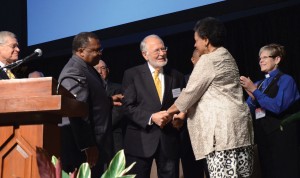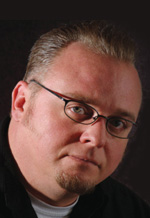By Steve Beard

Photo by Greg
Campbell. (L to R) the Rev. Keith Tonkel, Rev. Tim Thompson, Rev. Maxie Dunnam, Myrlie Evers, and Rev. Kathy Price.
History sometimes takes a long time to heal itself. The course corrections are often patchworked together over decades. “How long will prejudice blind the visions of men, darken their understanding, and drive bright-eyed wisdom from her sacred throne?” Dr. Martin Luther King Jr. asked in a famous speech in Montgomery, Alabama, on the steps of the State Capitol after completing the march from Selma to Montgomery in 1965.
Later in the speech, he answered the question with his trademark eloquence. “How long? Not long, because the arc of the moral universe is long, but it bends toward justice.”
A few years before King’s speech, 28 Methodist ministers of the then all-white Mississippi Conference issued a statement called “Born of Conviction,” written in response to the violent and fatal riots stirred by the admission of James Meredith, a courageous black student, to the University of Mississippi in 1962.
“Our Lord Jesus Christ teaches that all men are brothers,” read the statement published three months after the violent protests surrounding Meredith’s admission. “He permits no discrimination because of race, color, or creed.” To modern day sensibilities, the statement does not read like a radical manifesto. It was birthed out of the signers’ frustration that leaders in their Conference were tragically mute when it came to responding to the racial violence. Someone needed to issue a pastoral and prophetic Christian response in the wake of bloody turmoil.
On June 9, 2013, the Mississippi Annual Conference officially recognized the men who envisioned the long arc toward justice so long ago. Fifty years after the document was signed, The Commission on Religion and Race of the Mississippi Conference honored the 28 ministers with an award established in honor of Emma Elzy, an African American Methodist laywoman who spent her life as a racial relations advocate.
Myrlie Evers, wife of slain civil rights activist Medgar Evers, presented the award to the Revs. Maxie Dunnam and Keith Tonkel on behalf of all the signers. Fifteen of the ministers who signed the document are still alive.
The introduction of the 1963 statement read, “confronted with the grave crises precipitated by racial discord within our state in recent months, and the genuine dilemma facing persons of Christian conscience, we are compelled to voice publicly our convictions. Indeed, as Christian ministers, and as native Mississippians, sharing the anguish of our people, we have a particular obligation to speak.”
“In Mississippi parlance, all hell broke loose,” Dunnam told me when I asked about his experience. In his roles as world editor of The Upper Room, president of Asbury Theological Seminary, senior pastor of Christ UM Church in Memphis, president of the World Methodist Council, and co-founder of The Confessing Movement, I have known Maxie Dunnam personally and professionally for many years. Despite our lengthy friendship, I had no idea about this chapter of his life. All I knew was that we both had roots in the California-Pacific Annual Conference. I just had no idea how or why he landed in Southern California.
“Unfortunately, the Mississippi Annual Conference was crippled by internal ecclesiastical politics, making it impossible for the conference to speak with one voice on any issue,” Dunnam recalled. “To keep our statement out of that political arena, we four writers of the statement decided we would invite only younger clergy to join us in issuing the statement to the conference and the public. We wanted the issues to be kept clear. Twenty-four others joined us in signing.”
At the time of the document’s publication in the Mississippi Methodist Advocate, Dunnam was the organizing pastor of a church in Gulfport. He joined with three other ministers to write the document at his river camp in southern Mississippi.
“It was a bombshell in white Mississippi Methodism and in white Mississippi,” Dr. Joseph T. Reiff, a professor at Emory & Henry College in Virginia, told Good News. All the daily newspapers reported on it because it was the most public statement that went against the belief that all whites in Mississippi wanted segregation. “It was a crack in the wall of supposed unanimity among Mississippi whites” reported Reiff, a United Methodist minister who grew up in Mississippi who is writing a book about the statement.
“After the Ole Miss debacle [September 30/October 1, 1962], these 28 ministers believed that someone needed to say publicly that this was not true, and they were frustrated that their bishop and conference leaders – the white Mississippi Conference, which was the southern half of the state then – had said nothing in response to the Ole Miss riot/insurrection.
“Although the statement was written by four primary ministers, it was not generally known who had written it when it was published,” Reiff said. “Thus all 28 signers deserve equal credit for the statement. Some had a harder time than others in the aftermath; none had it easy.”
Over the next few years, many of the signers were compelled to leave Mississippi and serve in other areas throughout the United States because of public and private threats and condemnation. Dunnam and seven others found a new home in California. Eight of the clergymen served their ministerial tenure in Mississippi.
On June 9, the Revs. Keith Tonkel and Maxie Dunnam received recognition of prophetic foresight and fortitude. “I have no notion about whether we deserve to be honored, but it is good to know that memory sometimes serves us well,” Dunnam said.
It is in moments like these that we remember the heroes of the civil rights movement and the tremendous sacrifice of all those who worked, suffered, and strived for racial justice. We remember this all in the light of Dr. King’s observation that the moral arc bends toward justice.
“Maxie Dunnam was one of the early prophets in Mississippi in a time when most clergy remained silent in the face of racial inequality,” said Memphis Bishop William T. McAlilly, a Mississippi native. “He and his colleagues who were willing to speak truth to power gave courage to many.”
To all the men and their families who were honored, we say thank you.
Steve Beard is the editor of Good News.
